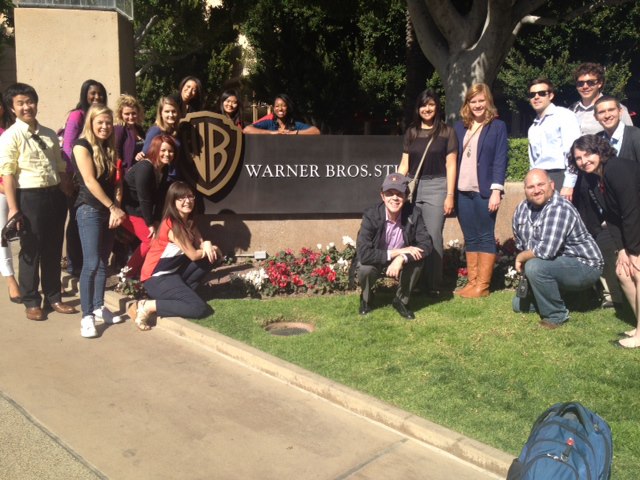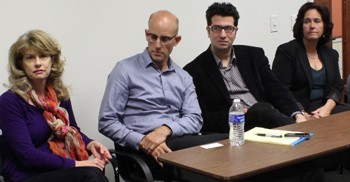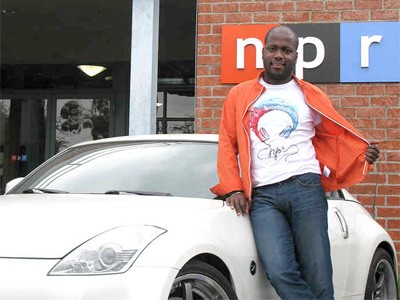A panel of journalists from the Los Angeles Times recently discussed what it’s like covering the entertainment industry, how it has changed and coverage challenges.
They all agreed that the beat’s biggest hurdle remains the same – finding the real story in Hollywood.
“Hollywood has never been known for truth telling,” said Dawn Chmielewski, who covers technology in the entertainment industry. “It’s difficult to get past stonewalling.”
The panel also included Times’ reporters Steve Zeitchik, Amy Kaufman, Chris Lee, John Horn, Mary McNamara, Meg James and Scott Collins. The chat was one of the first stops for a group of Arizona State University Walter Cronkite School of Journalism and Mass Communication students visiting Los Angeles to learn about the business of entertainment.
Journalists discussed how social media has changed the way entertainers approach their fans and journalists as well as the challenges they face with sources. The panel offered tips for young journalists, emphasizing that it’s important to remain professional.
Sometimes people don’t tell the truth, or they stall or they don’t respond, Chmielewski said.
“Behind every great story there’s a bunch of people trying to make money and people with agendas,” Chmielewski said.
The key to get past stonewalling is to be motivated, fair and honest, film writer, Zeitchik said. Many times, people will be more willing to talk if they know you have talked to a rival or someone else, he added.
Although many elements of the industry remain the same, the introduction and adaptation of social media has changed Hollywood.
For reporters, live tweeting and sharing of stories can help disburse information and gain more followers, film writer, Kaufman, said. Tweeting allows fans to interact with reporters.
For entertainers, social media has framed their entire persona, culture reporter, Lee, said. With Justin Bieber, Rihanna and Kanye West, what most fans and reporters know comes from social media websites like Twitter and Facebook. The three stars rarely give interviews anymore.
An actor’s value has diminished, said Horn, who writes about film. Increasingly the franchise makes the actor.
“It’s the rise of the super fan,” he said. “You play to the fan base and you give them what they want.”

Covering entertainment is more important than ever, the panel said. It’s important to follow the money and ask questions about what the numbers say, Chmielewski said.
“Pop culture has become such a dominant force,” said McNamara, an entertainment and culture reporter. “It’s an enormous force in people’s lives.”
The reporters’ recent coverage on the Oscars received the second most website views in the history of the paper. People read entertainment news all over the world so it’s important to write in a way that appeals to the masses.
“The ideal story for us is one that is equally read by consumers and people in the industry,” Horn said. “You don’t want to write as too much of an insider.”
Despite the reporting, many of the reporters approach their work as fans.
“It’s a fascinating, glamorous world,” Chmielewski said. “Everyone wants to cover it. Out of all the types of journalism I’ve done this is the most challenging.”
Reporters covering entertainment need a good poker face, Zeitchik said. Reporters cannot write from emotion, he added.
Kaufman said that reporters have to be careful about what information is on and off the record. It’s not a good idea to ruin a relationship with a publicist or contact, she added.
“Integrity takes a long time to develop and it can be lost in seconds,” Horn said. “You’re only as good as your last story.”










